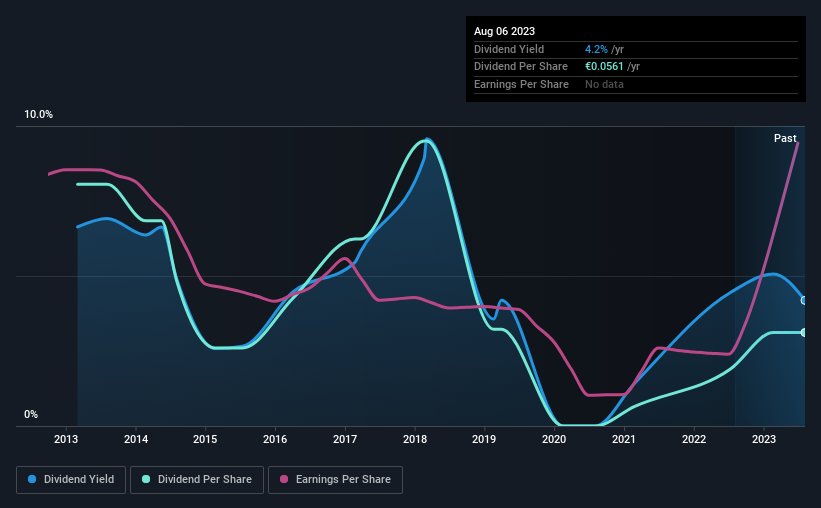Stock Analysis
HSBC Bank Malta (MTSE:HSB) Could Be A Buy For Its Upcoming Dividend

HSBC Bank Malta p.l.c. (MTSE:HSB) is about to trade ex-dividend in the next four days. Typically, the ex-dividend date is one business day before the record date which is the date on which a company determines the shareholders eligible to receive a dividend. The ex-dividend date is an important date to be aware of as any purchase of the stock made on or after this date might mean a late settlement that doesn't show on the record date. Therefore, if you purchase HSBC Bank Malta's shares on or after the 11th of August, you won't be eligible to receive the dividend, when it is paid on the 15th of September.
The upcoming dividend for HSBC Bank Malta is €0.06 per share, increased from last year's total dividends per share of €0.056. Dividends are a major contributor to investment returns for long term holders, but only if the dividend continues to be paid. So we need to investigate whether HSBC Bank Malta can afford its dividend, and if the dividend could grow.
See our latest analysis for HSBC Bank Malta
If a company pays out more in dividends than it earned, then the dividend might become unsustainable - hardly an ideal situation. Fortunately HSBC Bank Malta's payout ratio is modest, at just 30% of profit.
When a company paid out less in dividends than it earned in profit, this generally suggests its dividend is affordable. The lower the % of its profit that it pays out, the greater the margin of safety for the dividend if the business enters a downturn.
Click here to see how much of its profit HSBC Bank Malta paid out over the last 12 months.

Have Earnings And Dividends Been Growing?
Businesses with strong growth prospects usually make the best dividend payers, because it's easier to grow dividends when earnings per share are improving. Investors love dividends, so if earnings fall and the dividend is reduced, expect a stock to be sold off heavily at the same time. Fortunately for readers, HSBC Bank Malta's earnings per share have been growing at 16% a year for the past five years.
The main way most investors will assess a company's dividend prospects is by checking the historical rate of dividend growth. HSBC Bank Malta's dividend payments per share have declined at 9.1% per year on average over the past 10 years, which is uninspiring. HSBC Bank Malta is a rare case where dividends have been decreasing at the same time as earnings per share have been improving. It's unusual to see, and could point to unstable conditions in the core business, or more rarely an intensified focus on reinvesting profits.
To Sum It Up
Should investors buy HSBC Bank Malta for the upcoming dividend? Typically, companies that are growing rapidly and paying out a low fraction of earnings are keeping the profits for reinvestment in the business. Perhaps even more importantly - this can sometimes signal management is focused on the long term future of the business. We think this is a pretty attractive combination, and would be interested in investigating HSBC Bank Malta more closely.
So while HSBC Bank Malta looks good from a dividend perspective, it's always worthwhile being up to date with the risks involved in this stock. Every company has risks, and we've spotted 2 warning signs for HSBC Bank Malta (of which 1 makes us a bit uncomfortable!) you should know about.
Generally, we wouldn't recommend just buying the first dividend stock you see. Here's a curated list of interesting stocks that are strong dividend payers.
Valuation is complex, but we're helping make it simple.
Find out whether HSBC Bank Malta is potentially over or undervalued by checking out our comprehensive analysis, which includes fair value estimates, risks and warnings, dividends, insider transactions and financial health.
View the Free AnalysisHave feedback on this article? Concerned about the content? Get in touch with us directly. Alternatively, email editorial-team (at) simplywallst.com.
This article by Simply Wall St is general in nature. We provide commentary based on historical data and analyst forecasts only using an unbiased methodology and our articles are not intended to be financial advice. It does not constitute a recommendation to buy or sell any stock, and does not take account of your objectives, or your financial situation. We aim to bring you long-term focused analysis driven by fundamental data. Note that our analysis may not factor in the latest price-sensitive company announcements or qualitative material. Simply Wall St has no position in any stocks mentioned.
About MTSE:HSB
HSBC Bank Malta
HSBC Bank Malta p.l.c., together with its subsidiaries, provides various banking and related financial services in Malta.
Solid track record with adequate balance sheet and pays a dividend.

